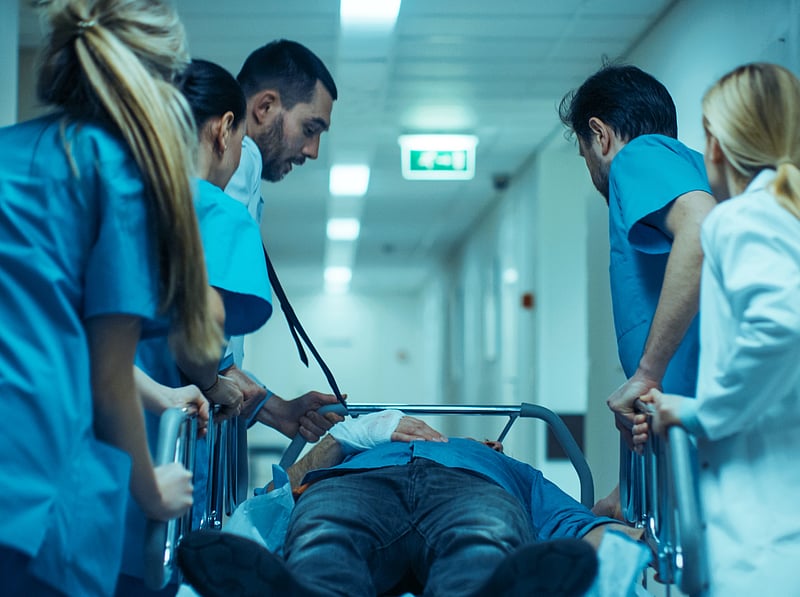Manténgase sano!

- Steven Reinberg
- Posted May 24, 2023
Opioid Overdose Survivors Face Higher Odds for Death in Following Year
Surviving a trip to the emergency room for an opioid overdose dramatically increases a patient's odds of dying in the year after, U.S. health officials reported Tuesday.
Of nearly 287,000 emergency room visits in 2016, more than 8,300 were for opioid overdoses. Of these, nearly 500 patients were dead from a drug overdose in the following year and 400 died from other causes, according to a new report from the U.S. Centers for Disease Control and Prevention.
"If you're presenting in the emergency room, and you survived an overdose, you are at greater risk of dying of a drug overdose within a year of discharge," said lead researcher Merianne Spencer, an epidemiologist at the CDC's National Center for Health Statistics.
Fentanyl was the cause of nearly 54% of overdose deaths, followed by heroin (35%) and cocaine (18%).
Spencer said that fentanyl might have been involved in some of the deaths attributed to heroin and cocaine, and heroin and cocaine might have also been involved in some deaths attributed to fentanyl. They can't, however, tease that out of the data they used.
Of patients who died from other causes, 23% died from heart disease or stroke; 14% from cancer or other tumor, and 13% from other causes such as suicide, murder or accident.
For the study, Spencer's team used 2016 data from the national death index and a nationwide hospital care survey.
One expert not part of the research said emergency departments have made significant progress since then to reduce the number of overdose deaths.
"I do think that as an industry we've done a lot to prevent fatal overdoses in terms of making sure that we're distributing naloxone within our emergency departments to patients and families, as well as just better understanding of harm reduction strategies," said Dr. Sandeep Kapoor, assistant vice president of Addiction Services at Northwell Health in New Hyde Park, N.Y.
In 2016, for example, Northwell started a naloxone saturation campaign, which offered a free naloxone rescue kit to anybody that was interested, he said. Naloxone is a medication that rapidly reverses an opioid overdose.
"Since we started that program, we've given out close to 13,000 rescue kits within our 18 emergency departments and many other community-based initiatives," Kapoor said.
Northwell has also started treating addiction within the emergency department, and keeps in touch after patients leave, he said.
"This means making sure that someone is not left on their own to navigate, but we as health care professionals, as well as folks with lived experience are involved with the situation to help support that individual and family that may be in crisis," Kapoor said.
This type of follow-up is a regular part of care for many health conditions but is new when it comes to drug addiction, he said.
Not providing this care has been largely due to the stigma surrounding drug addiction, Kapoor said.
"If we discharge them without any further outreach or engagement or support, how are we really setting someone up for success?" he said. "That's really been the drive of our organization is looking at this humanistically and understand that there is so much more that we can be doing."
Kapoor added that it's important to think about addiction like any other illness and to put the same mechanics into play.
"If someone is struggling, let's get them at least to outpatient care and see what other needs that they have and if they need to be referred or stepped up in care," he said.
Kapoor said the health care community should focus its efforts on keeping drug users alive by providing naloxone, fentanyl test strips and treatment.
It's unrealistic to demand that everyone stop using drugs, he said.
"Drug use has been going on for centuries. If we keep continuing that stigma and judge and shame people, all we're really doing is pushing them away. Drug use is going to happen anyway," Kapoor said. "But we can reduce the number of overdoses and keep people alive."
The new findings were published May 23 in National Health Statistics Reports.
More information
For more on drug overdoses, see the U.S. Centers for Disease Control and Prevention.
SOURCES: Merianne Spencer, MPH, epidemiologist, National Center for Health Statistics, U.S. Centers for Disease Control and Prevention; Sandeep Kapoor, MD, assistant vice president, Addiction Services, Northwell Health, New Hyde Park, N.Y.; National Health Statistics Reports, May 23, 2023





